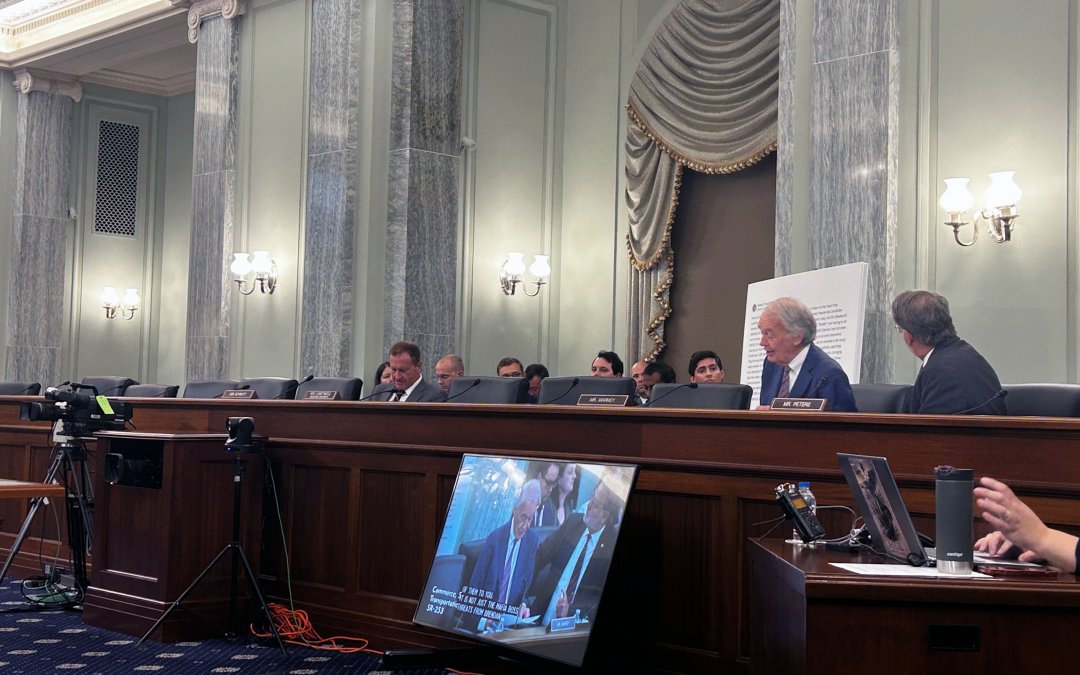WASHINGTON – Lawmakers and witnesses emphasized the threat government censorship poses to First Amendment rights in a Senate Commerce hearing Wednesday, with Republicans referencing Biden officials’ censorship of social media and Democrats focusing on the current weaponization of free speech by the Trump administration.
The hearing followed an investigation led by Committee Chairman Ted Cruz (R-Texas) on the Cybersecurity and Infrastructure Security Agency (CISA)’s role in “jawboning” big tech companies into disproportionately silencing conservative viewpoints during the Biden presidency. The practice of jawboning refers to the “inappropriate demands made of private actors by government officials,” according to a paper published by the Cato Institute.
In a report outlining the investigation, the Committee found that CISA “acted outside both the First Amendment and its own authority” by conducting a censorship campaign of “constitutionally protected speech.” The Supreme Court reviewed these censorship claims in a 2024 case Murthy v. Missouri and sided with the Biden administration in a 6-3 ruling, citing that the plaintiffs lacked sufficient standing to sue.
“This hearing is a farce,” Sen. Ed Markey (D-Mass.) said. “We are not focusing on the imminent threat to the First Amendment, the beating heart of democracy.”
Markey noted that the Committee is “re-litigating an issue that the Supreme Court has already decided” and focused his questioning on the ongoing threats made by the Trump administration to revoke media outlets’ access and licenses based on their “editorial decisions.”
Senate Democrats also tailored their remarks and questioning to Federal Communications Commission (FCC) Chair Brendan Carr’s role in the temporary suspension of Jimmy Kimmel’s late night show. In an appearance on Benny Johnson’s podcast last month, Carr said, “We can do this the easy way or the hard way,” in reference to ABC and local affiliates. Hours later, ABC announced it was pulling Kimmel’s show.
Ranking Member Sen. Maria Cantwell (D-Wash.) outlined the chain of events that led to the pre-empting of Kimmel’s show following his comments on Charlie Kirk’s assassination and argued that they should “alarm every American.”
“I think indeed the remarks made by Chairman Carr seemed to be an attempt at coercion,” said Eugene Volokh, senior fellow at Stanford University’s Hoover Institution. “Whether or not they actually caused the suspension of Jimmy Kimmel, they were an attempt to do something the Constitution does not allow.”
“I certainly hope that Chairman Carr does come here to testify,” said Sen. Ben Ray Luján (D-New Mexico). “There’s several of us that have authored legislation to protect [the First Amendment] and maybe it’s something that can become bipartisan.”
In his testimony, CEO and Co-Founder of conservative magazine The Federalist Sean Davis claimed that the “defenses of media millionaires like Jimmy Kimmel are based more on partisanship than any sort of actual belief in free speech.” Davis testified on CISA’s role in “directing and funding censorship efforts” based on the outlet’s criticism of the government and media response to the COVID-19 pandemic and the Black Lives Matter (BLM) moment.
Kirk’s assassination itself also emerged as a recurring topic among lawmakers and witnesses, with Davis describing his murder as an example of the rippling effects of censorship.
“It begins with censorship, it moves to the destruction of statues and monuments, and it ends with the murder of people,” Davis said.
Despite intense debate and divided opinion on Biden and Trump censorship campaigns, Luján acknowledged that “there is a lot of agreement” within the Committee.
“I don’t know anyone in that room that disagrees with protecting the First Amendment…no one,” Luján said.
The Committee will continue ongoing discussions on free speech protections and has invited Carr to testify before a panel over Kimmel’s suspension. A hearing date has not yet been announced.


